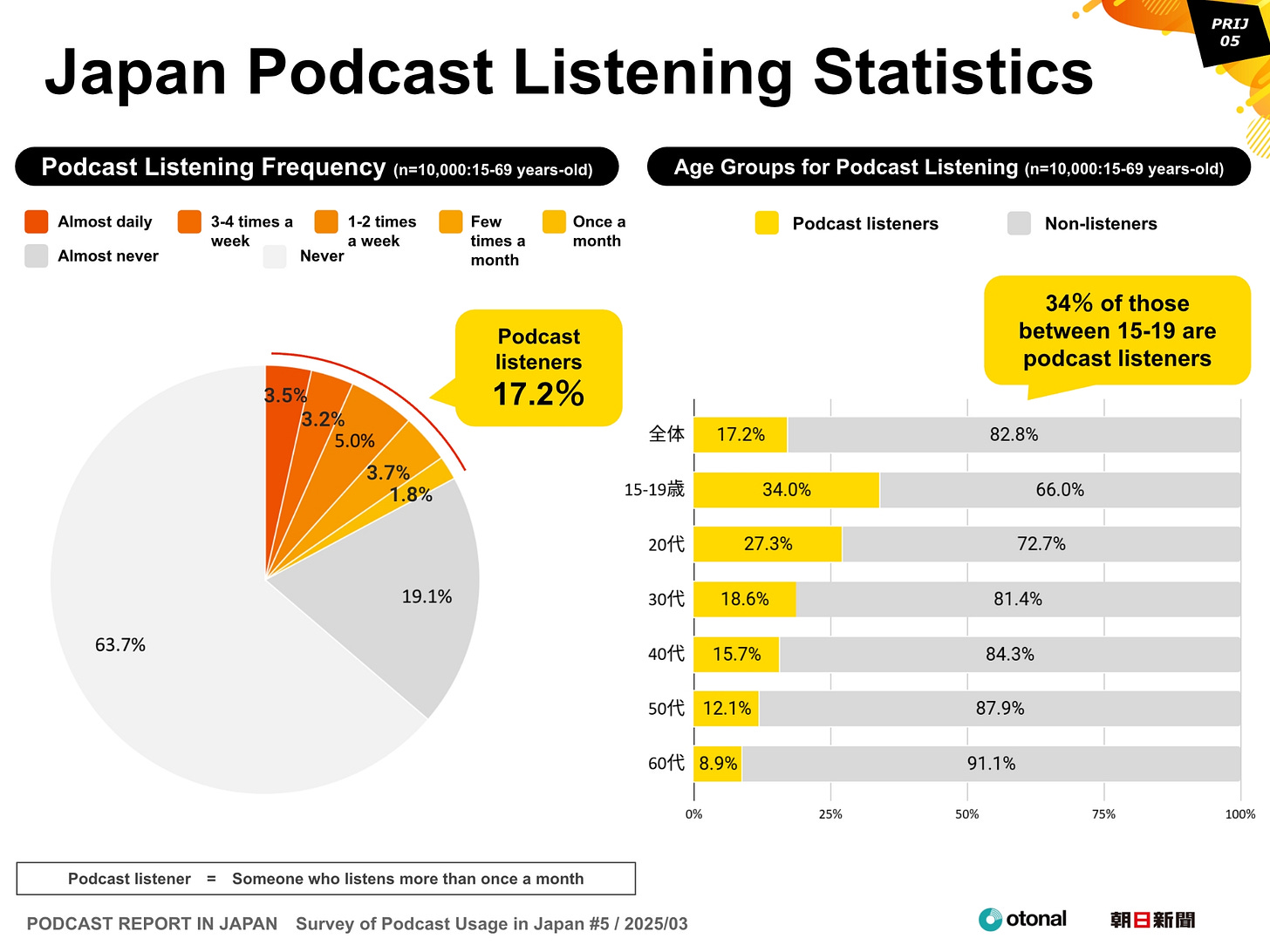Japan's podcast scene is changing quickly; usage now stands at 17.2% and is rising year over year. A recent poll indicates that young Japanese listeners are swarming to podcasts; 34% of 15–19 year olds and 27.3% of those in their twenties tune in monthly.
But here's what should really grab your attention: podcasts now rank second only to Tiktok in usage rates across all age groups in Japan, having exceeded Netflix and Facebook. This is more than just development; it's a major shift in media consumption reflecting world trends but with distinct Japanese characteristics.
The Key Points:
Podcast usage in Japan has reached 17.2%, with particularly high adoption among young listeners (34% of 15-19 year-olds)
Japanese podcast listeners prefer shorter content, with about 50% frequently choosing programs under 30 minutes
YouTube dominates as the #1 podcast platform in Japan (39.2%), followed by Spotify (33%)
More than half of Japanese podcast listeners have made purchase decisions based on podcast content
Podcasts now outrank Netflix and Facebook in terms of usage across all age groups in Japan.
Why It Matters
The Japanese podcast market represents a microcosm of global shifts in audio consumption, but with critical distinctions every podcaster should understand. The preference for shorter content (particularly among teens, 40% of whom favor programs under 20 minutes) reflects a broader industry trend towards bite-sized, focused podcast episodes, diverging from the traditional longer formats. Meanwhile, YouTube's dominance as the primary listening platform reinforces what we've been seeing globally – podcasting's future increasingly involves visual components, even in traditionally audio-first markets. Most compelling is the 55.3% of listeners who have purchased products or visited places mentioned in podcasts, demonstrating the medium's remarkable commercial influence in a notoriously difficult advertising market.
The Big Picture
For podcasters and producers, Japan's evolving podcast landscape offers both a blueprint and an opportunity. The data points to several actionable strategies: create shorter, more focused content formats to capture younger demographics; optimize for YouTube alongside traditional podcast platforms; and develop direct response advertising approaches that can convert the more than half of listeners willing to act on podcast recommendations. The industry as a whole benefits from understanding these regional variations, as they provide valuable insights into tailoring global distribution and monetization strategies.
For example, the distinct preferences in Japan could influence content creation and advertising strategies on a global scale. While Western podcasters typically create 40+ minute episodes, this research suggests that experimenting with sub-30 minute formats could unlock significant audience growth.
The findings also reinforce the critical importance of multi-platform distribution strategies that prioritize YouTube alongside traditional podcast channels – not as an afterthought, but as a primary distribution vehicle.
Based on the extensive "PODCAST REPORT IN JAPAN: Survey of Podcast Usage in Japan #5" by Otonal Inc. and The Asahi Shimbun Company in December 2024 and published in March 2025, the Japanese podcast market shows strong growth, especially among younger demographics, revealing consumption patterns that offer valuable insights for podcast creators and advertisers globally.
Editorial Discretion Notice
This publication reserves the right to determine what content to publish, how to present it, and when it appears. Our editorial team makes independent decisions based on journalistic standards, newsworthiness, and audience relevance. While we strive for fairness and balance, we cannot cover every story or perspective. Opinion pieces do not necessarily reflect our official position. We remain committed to accurate, ethical journalism that serves the public interest.
If you found this valuable, consider Restacking so more people can see it.
Despite the financial challenges that our industry faces, we have decided to keep our reporting open to the public because we believe that everyone has the right to know the truth about the events that shape their world.
Thanks to the support of our readers, we can continue to provide free reporting. If you can, please choose to support The Podwires





